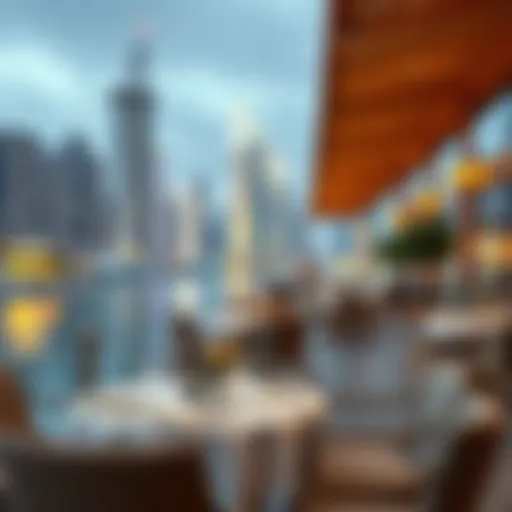Exploring Michelin-Starred Dining in Dubai


Intro
Dubai's culinary scene has become a subject of global fascination as it embraces the prestigious Michelin Star designation. The emergence of these starred establishments reflects not just the evolving palate of residents and visitors alike, but also the ambitious drive of the city to position itself as a premier destination for fine dining. In this exploration, we’ll unpack the layers of Dubai's Michelin-star landscape, examining how these acclaimed restaurants elevate the city’s gastronomic reputation and add a new dimension to its cultural identity.
Beyond just refined dining, Michelin-starred restaurants have woven themselves into the very fabric of Dubai’s social and economic structure. The city, known for its vibrant diversity, has seen an influx of culinary talent from all corners of the globe, creating a melting pot of flavors and experiences. This article will analyze how Michelin ratings create ripples through local dining culture, their influence on tourists’ choices, and the intricacies of restaurant operations that contribute to Michelin’s meticulous evaluation standards.
In today’s fast-changing world, understanding what’s cooking in Dubai is crucial for investors and diners alike. As the culinary landscape continues to shift, let’s delve deeper into the experience and significance of Michelin-starred dining in this city that never sleeps.
Prologue to Michelin Stars
Delving into the realm of fine dining, Michelin Stars represent not only culinary excellence but a hallmark of prestige. These stars serve as a beacon for diners, guiding them towards experiences that promise more than just a meal. In an industry where differentiation is crucial, stars from the Michelin Guide offer an internationally recognized standard, elevating a restaurant's reputation and, arguably, its profitability. This narrative aims to shed light on what the Michelin Star designation encompasses and why it holds such sway in the culinary landscape.
History of the Michelin Guide
The origins of the Michelin Guide trace back to 1900, when Édouard Michelin and his brother André sought to encourage automobile travel in France. They published the first guide as a means to assist drivers in locating service stations, mechanics, and, importantly, restaurants. Over the years, the guide evolved, adopting a more focused critique on the dining scene, especially after the awarding of stars began in 1926.
In the early days, one star indicated a "very good restaurant in its category," while three stars, which is the pinnacle achievement, denotes a culinary experience that is worth a journey. The criteria for selecting which establishments earn these coveted stars remain a well-guarded secret, adding an air of mystery and allure to the process. Today, the Michelin Guide has expanded globally, including bustling cities like Dubai, where a rich tapestry of culinary cultures converges, making it a vibrant hub for gastronomes.
The Significance of Michelin Stars
Acquiring a Michelin Star isn't merely a badge of honor for chefs; it reshapes the entire landscape of a restaurant's operation. First and foremost, it enhances visibility, often leading to increased reservations and elevated expectations from patrons. A star puts restaurants on the map—literally and figuratively—engendering a kind of prestige that attracts not just local diners but also international tourists eager to taste Michelin-recognized cuisine.
Moreover, obtaining one or more stars fosters a sense of pride within culinary teams. It often translates to greater investment in ingredient quality, staff training, and innovative techniques. As a direct consequence, this uplift in standards positively affects local dining cultures, pushing chefs to maintain or even elevate their cooking to compete within a thriving market.
"Michelin Stars do not just denote exceptional food but also symbolize commitment, creativity, and a relentless pursuit of perfection."
In essence, the significance extends beyond the restaurant's walls; it alters consumer expectations and stimulates culinary innovation in a broader sense. For investors or property managers, understanding the Michelin Star phenomenon is crucial, as it establishes a direct link between dining prestige and local economic vitality.
As we proceed through this exploration of Dubai’s culinary scene, the role of Michelin Stars will undoubtedly emerge as a pivotal factor influencing both food trends and the city's reputation on the global dining stage.
Dubai's Culinary Scene
When engaging with the culinary landscape of Dubai, it’s immediately clear that this city isn’t just about skyscrapers and luxury malls; it boasts a vibrant and dynamic food scene that mirrors its diverse population. The importance of Dubai's culinary scene extends beyond mere sustenance—it serves as a reflection of its multicultural identity and rapid growth into a global epicenter for dining excellence. With the influx of visitors and residents from various parts of the world, the culinary offerings have become a microcosm of the flavors, techniques, and traditions of numerous cultures. This section delves into two facets that define Dubai's gastronomic identity: its role as a melting pot of cultures and the rapid emergence of fine dining establishments.
A Melting Pot of Cultures
Dubai is often described as a melting pot, and with good reason. The city's population comprises people from over 200 nationalities, each bringing their unique culinary heritage. This culinary convergence leads to an extraordinary variety of dining options, from street food stalls serving authentic Indian chaat to high-end restaurants offering exquisite French cuisine.
Some key characteristics of this melting pot include:
- Diverse Influences: The influence of various cultures has birthed unique fusions, such as Arabic and Southeast Asian flavors merged into contemporary dishes. For instance, a local favorite, the Thai green curry hummus, showcases such a creative blend.
- Accessibility of Global Ingredients: The close-knit ties that Dubai maintains with countries across the globe ensure that chefs have access to a plethora of ingredients. This availability enables culinary professionals to innovate and elevate their dishes to an extraordinary level.
- Culinary Festivals: Dubai regularly hosts food festivals that celebrate its diverse culture. Events like the Dubai Food Festival showcase everything from traditional Emirati dishes to modern fusion cuisine, attracting food enthusiasts worldwide.
Through each bite, diners can traverse continents, exploring the kitchens of Greece, Mexico, Japan, and many other nations right within this bustling city.
Emergence of Fine Dining
The rise of fine dining in Dubai marks another significant evolution within its culinary scene. Once largely dominated by casual dining, the city has rapidly become home to a portfolio of upscale restaurants that not only satisfy the palates of discerning diners but also push the boundaries of creative culinary expression.
What has facilitated this surge in fine dining includes:


- Celebrity Chefs: The allure of renowned chefs, such as Gordon Ramsay and Nobu Matsuhisa, who have ventured into the city, has elevated local dining standards. These chefs often bring unique concepts that drive culinary excellence and creativity.
- Investment in Culinary Innovation: Restaurants in Dubai are heavily investing in state-of-the-art kitchens and unique dining concepts, allowing chefs to experiment with cutting-edge techniques such as molecular gastronomy.
- Luxury Experience: Diners in Dubai often seek more than just a meal; they are on the hunt for an immersive experience. High-end restaurants often provide artful presentations, exquisite décor, and exemplary service that turn dining into a memorable event.
The fine dining scene in Dubai is still in its nascent stages, yet it is evolving rapidly. The intersection of global influences and local traditions creates a unique environment fostering creativity and ambition among chefs. This trend continues to shape not only the identity of Dubai's culinary scene but also its position on the global dining map.
"Dubai does not only celebrate cuisine; it celebrates the very art of dining as an immersive experience for all senses.”
Ultimately, as Dubai’s culinary scene thrives and evolves, it will be fascinating to watch how it continues to develop, adapt, and influence the broader global culinary landscape.
Michelin Star Restaurants in Dubai
The presence of Michelin star restaurants in Dubai marks a pivotal chapter in the city's culinary narrative. This esteemed accolade transforms not just the restaurants that achieve it, but also impacts the surrounding community, economy, and cultural identity of Dubai. By bringing international attention to local chefs and their creative offerings, these restaurants elevate the standards of dining in the region. For investors and property managers, the Michelin star status can indicate a lucrative opportunity in the hospitality sector. The potential for increased patronage from both local residents and international visitors, drawn by the allure of a Michelin-starred meal, cannot be understated.
"Michelin stars are a beacon of culinary excellence, guiding diners toward the finest gastronomic experiences."
List of Current Michelin-Starred Establishments
Dubai's culinary landscape has been enriched by several established names recognized by the Michelin Guide. Here’s a brief rundown of the current Michelin-starred restaurants:
- Al Muntaha: Located in the Burj Al Arab, it offers breathtaking views and a refined menu.
- Il Ristorante - Niko Romito: Known for its Italian fare with a modern twist, this eatery brings a taste of Italy to the desert.
- Zuma: A contemporary Japanese izakaya, Zuma is famed for its chic ambiance and exceptional sushi.
- Carine: A modern brasserie that combines French cuisine with local influences, it has garnered attention for its innovative dishes.
- Cé La Vi: Perched atop the Address Sky View, it offers stunning views alongside an eclectic menu.
These establishments not only exemplify cooking prowess but also display how Dubai's restaurants reflect global trends while incorporating local flavors.
Noteworthy Features of Each Restaurant
Each star-awarded restaurant in Dubai offers unique elements that contribute to its appeal:
- Al Muntaha: Its culinary offerings are paired with an unparalleled view from the 27th floor of the Burj Al Arab. The menu here showcases exquisite seafood and Mediterranean dishes, crafted with meticulous care.
- Il Ristorante - Niko Romito: Distinguished by its simplicity and elegance in Italian cooking, this restaurant emphasizes quality ingredients, offering a menu that changes with the seasons.
- Zuma: This restaurant promotes a communal dining experience, enhancing enjoyment with its vibrant atmosphere and a vast selection of sake. It beautifully integrates classic Japanese techniques with innovative flair.
- Carine: Here, the rustic aesthetic meets sophisticated palate. Every dish tells a story rooted in French traditions, while the pastry selections are particularly noteworthy, showcasing the creativity of the chef.
- Cé La Vi: Known for its rooftop bar and lively vibe, it caters not only to food lovers but also to those seeking nightlife. Its fusion of Asian cuisines reflects the diverse demographic of Dubai, attracting gourmets and casual diners alike.
As the city continues to evolve as a culinary hotspot, its Michelin-starred establishments stand as testaments to the dedication and passion of chefs striving for excellence in artistry and flavor.
Criteria for Michelin Star Awards
The Michelin Star Awards are the gold standard when it comes to evaluating fine dining experiences. For chefs and restaurateurs, receiving a Michelin star can elevate their establishments to an elite class, driving not just prestige but also significant revenue and foot traffic. The criteria on which the awards are based hold profound significance for Dubai’s restaurants, helping to shape and redefine culinary excellence in this vibrant city.
A Michelin star is much more than a shiny accolade; it serves as a promise of quality, drawing discerning diners who are willing to pay a premium for a memorable meal. Understanding these criteria is crucial, as it gives insight into what sets apart Michelin-starred establishments in Dubai and highlights the ongoing evolution of its culinary scene.
Judging Factors
When Michelin inspectors evaluate a restaurant, multiple factors come into play, each weighted according to its impact on the dining experience. The primary factors include:
- Quality of Ingredients: The choice and sourcing of ingredients are non-negotiable. Inspectors look for freshness and a clear indication that the chef uses finest ingredients, local or otherwise.
- Skill in Cooking: There’s an expectation of expert technique here. Whether it’s a perfect sear on a piece of fish or a harmonious balance of flavors in a sauce, skill is paramount.
- Harmonious Flavor Combinations: Dishes should not only be well prepared but should also showcase a creative and balanced blend of flavors, demonstrating the chef’s signature style.
- Consistency: A Michelin-starred restaurant is expected to deliver a high-quality experience every single time. Consistency is key, as diners often return expecting to enjoy the same culinary excellence.
- Personality of the Chef: This aspect evaluates whether the chef’s vision and creativity are reflected in the menu. Unique offerings that express individuality often catch inspectors’ discerning eyes.
These judging factors help create a transparent assessment framework, allowing both diners and restaurateurs to understand what it takes to excel in this competitive environment. In Dubai, these comprehensive assessments often boost chefs’ motivation to push the envelope further.
Anonymity of Inspectors
An essential component that maintains the integrity of the Michelin star awarding process is the anonymity of its inspectors. Inspectors typically dine incognito and unannounced at establishments, which helps to ensure that they receive the same treatment as any other patron. This anonymity is critically important for several reasons:
- Ensures Fairness: Because inspectors are not known to the restaurants, they receive the authentic dining experience intended for all guests. This leads to an accurate assessment of food and service quality.
- Maintains Objectivity: By remaining anonymous, inspectors can evaluate restaurants without any bias or influence. Their reviews are based solely on the quality of the dining experience.
- Encourages Consistency: If restaurants know they’re being inspected, they cannot provide a special treatment or altered menu just for that occasion. Thus, inspectors can gauge the restaurant’s reliability over time.
"The Michelin Guide remains an authority due to its rigorous standards and commitment to preserving the mystery surrounding its judges. "


In Dubai, where the dining landscape is as competitive as it is diverse, understanding the anonymity of inspectors helps restaurant owners and chefs appreciate the rigorous evaluation their establishments undergo, pushing them to refine and innovate continually.
As the city’s culinary scene becomes more refined, knowledge of these criteria empowers stakeholders, from chefs to investors, in nurturing an environment where culinary creativity and excellence thrive.
Impact of Michelin Stars on Local Dining Culture
The Michelin star system has ushered in a new era for the dining landscape in Dubai. Its impact is not just felt in the kitchens of high-end restaurants but within the very fabric of the city’s culinary culture. Michelin stars serve as a beacon, attracting not only local diners but also an international clientele eager to experience world-class gastronomy. Establishments that earn these accolades have become landmarks, shaping how both locals and tourists perceive the culinary arts.
In the United Arab Emirates, food is much more than just sustenance; it's a celebration of culture and heritage. With the introduction of Michelin stars here, dining has taken on a new level of sophistication and expectation. The conversation around food has shifted dramatically—from being merely a necessity to becoming an experience that demands attention to detail, creativity, and authenticity.
Consumer Expectations
With Michelin stars now a part of the Dubai dining conversation, consumer expectations have escalated. Diners are no longer satisfied with simply a meal; they seek an immersive experience, one that is underscored by exceptional service and exquisite presentation. As a result, many restaurants, whether they possess a star or not, have begun to enhance their offerings to meet this heightened demand.
- Quality of Ingredients: The pursuit of excellence means chefs are sourcing the finest ingredients. Many are now forming direct relationships with local farmers and suppliers, emphasizing freshness and quality.
- Innovation in Cuisine: Patrons expect not only traditional dishes but also innovative twists that showcase creativity while respecting culinary heritage. The melding of flavors, techniques from various cultures, and unexpected pairings have become commonplace.
- Overall Dining Experience: Consumers now look at the entire experience—ambiance, service, and even the storytelling behind the cuisine. A casual dining outing is now transformed into a complete sensory journey.
"The arrival of Michelin stars in Dubai has created a sophisticated dining palette, turning local diners into discerning gastronomes."
Influence on Chefs and Culinary Innovation
The presence of Michelin stars has undeniably sparked a wave of innovation among local chefs. These culinary artists are under immense pressure to not only meet but also exceed the expectations placed upon them. The influence is palpable in several ways:
- Creativity in Cooking: Chefs are increasingly experimenting with ingredients and techniques, pushing boundaries to produce unique dishes that resonate with diners. Many chefs now incorporate elements of their own heritage into their menus, leading to a more diverse culinary scene.
- Networking and Collaboration: The Michelin spotlight fosters a sense of community among chefs. They often collaborate on events or pop-ups, sharing ideas and inspirations that trickle down into their permanent offerings. Inspiration flows freely, leading to exciting new gastronomic avenues.
- Professional Development: With the pressure to earn or maintain Michelin stars, chefs are pursuing additional training and learning opportunities. They attend workshops, seminars, and culinary competitions that not only enhance their skills but also elevate Dubai’s standing on the global culinary stage.
As the Michelin star system continues to evolve in Dubai, its impact on both consumer expectations and culinary innovation becomes ever more significant. The city is transforming into a culinary epicenter, where dining is a dynamic reflection of a diverse cultural tapestry—one that celebrates both tradition and modernity.
Tourism's Role in Dubai's Gastronomy
In recent years, tourism has become a lifeblood of Dubai's economy, shaping not only its skyline but also its culinary landscape. The influx of visitors from around the globe seeking luxury, leisure, and unique experiences has brought with it a demand for world-class dining options. Michelin-starred restaurants, with their reputation for excellence, play a crucial role in fulfilling these expectations.
Dubai's strategic location as a global hub for tourism means that it attracts an array of international visitors who come with diverse culinary preferences. From adventurous foodies to families looking for a memorable dining experience, the variety in palates fuels innovation in the dining sector. This ensures that Dubai remains on the map as a serious contender in the world of fine dining.
Attraction of International Visitors
Tourism in Dubai is not just about sightseeing; it’s heavily intertwined with gastronomy. The Dubai Shopping Festival or the Dubai Food Festival showcases not just shopping attractions but highlights local culinary ingenuity, often featuring Michelin-starred chefs and restaurants.
- Global Exposure: As travelers flock to Dubai, they bring along expectations informed by their culinary backgrounds, creating a unique cross-cultural exchange.
- Gastronomic Tourism: Many visitors actively seek Michelin-starred venues, making reservations months in advance, which underscores the significance of these establishments in their travel plans.
- Culinary Events: Events like food festivals or chef showcases draw attention to Dubai's gastronomic scene, further attracting culinary enthusiasts globally.
The city’s blend of traditional and contemporary cuisine, amplified by its Michelin stars, transforms Dubai into a gastronomic destination.
"The culinary diversity in Dubai not only satisfies varied tastes but also enhances the city’s status as a place where cuisine becomes an experience in itself."
Culinary Tourism Development
Culinary tourism is rapidly becoming a key segment of Dubai’s overall tourism strategy. Visitors are not just looking for a meal; they desire experiences tied to local ingredients, cultural narratives, and artistic presentations. This has ushered in a new era for restaurants aiming to capture this growing market.
- Tailored Experiences: Many Michelin-starred restaurants is tailoring menus to showcase regional flavors or even recreating traditional dishes with a modern twist, engaging diners beyond mere consumption.
- Workshops and Classes: Establishments that offer cooking classes or guided tastings often find a loyal following among tourists who wish to deepen their understanding of Dubai's culinary heritage.
- Collaboration and Innovation: Michelin-starred chefs frequently collaborate with local producers, creating seasonal menus that not only highlight aesthetic appeal but also sustainability—a growing concern among today’s discerning diners.
Through investing in culinary tourism development, Dubai can tap into a lucrative market that promises to elevate not only its dining scene but also broaden its economic landscape, appealing to a sophisticated audience keen to experience the best of what the city offers.
Challenges Facing Michelin Star Restaurants in Dubai


Navigating the world of Michelin-starred dining in Dubai comes with its unique set of challenges that can affect the sustainability and growth of these esteemed establishments. In a city that constantly reinvents itself, Michelin-starred restaurants face pressures that can sometimes feel like they're walking a tightrope. Understanding these challenges is crucial for investors, home buyers, and property managers who are keen on grasping the complexities that influence the region’s upscale dining scene.
Supply Chain and Ingredient Sourcing
One of the most pressing issues for Michelin-star restaurants in Dubai is the supply chain logistics and the sourcing of high-quality ingredients. Unlike many culinary hubs around the world, Dubai is a relatively arid territory with limited agricultural production.
- Global Sourcing Needs: Top-tier chefs often need access to specific ingredients from around the globe to create their unique culinary masterpieces. For instance, the hunt for seasonal truffles or fresh seafood might require extensive shipping, which can be costly and time-consuming.
- Import Regulations: Stringent import regulations can stymie the procurement of essential goods. Navigating customs and ensuring the freshness of ingredients can become a logistical nightmare if not handled efficiently.
- Local Produce Limitations: While there is a growing interest in farm-to-table practices, the availability of local produce is often inconsistent. Chefs find themselves at a crossroad, deciding whether to uphold their restaurant’s standards or adapt their menus based on what is available. This can impact the overall dining experience significantly.
Market Competition
The competitive landscape in Dubai’s fine dining sector cannot be overstressed. With new dining options cropping up seemingly every week, maintaining a Michelin star requires more than just exceptional food; it demands continual innovation and strategic foresight.
- Saturation of Restaurants: As more establishments vie for the attention of a multifaceted audience, the competition for a piece of the dining pie becomes fiercer. New openings can overshadow existing restaurants, making it crucial for Michelin-starred venues to differentiate themselves, be it through unique offerings or exceptional service.
- Shifting Consumer Preferences: With the influx of international visitors and a diverse local population, consumer preferences can change like the wind. What’s trending today might be passé tomorrow, leaving chefs to constantly adjust their menus to meet the evolving tastes.
- Talent Retention: The ability to maintain a skilled workforce is another challenge. As Michelin-starred restaurants strive to keep pace with the competition, attracting and retaining skilled chefs and staff is become increasingly critical. Many talented chefs seek opportunities in other regions, lured by prospects of immense creativity and varying culinary styles.
Successful Michelin-starred entities find a way to maneuver through these challenges while continually evolving and engaging their clientele. A firm grasp on supply chain dynamics and a keen awareness of market conditions can help pave the path for growth and sustained excellence in Dubai’s vibrant culinary landscape.
Future of Fine Dining in Dubai
The future of fine dining in Dubai is a fascinating topic that reflects the evolving tastes and expectations of both residents and international visitors. As the city continues to position itself as a global culinary hub, understanding what lies ahead is crucial. Fault lines in culinary trends, sustainability threads, and changes in consumer behavior are all significant to grasp.
In the coming years, we can expect an explosion of creativity among chefs, blending traditional flavors with modern techniques. Furthermore, the allure of Michelin stars is likely to intensify, driving restaurants to elevate their offerings even further. The dynamics of food service are changing, with technological advancements paving the way for new dining experiences.
Emerging Trends in Cuisine
There’s a palpable shift in how cuisine is approached in Dubai. Many chefs are diving into fusion dishes that embrace local ingredients while drawing on global influences. For instance, Middle Eastern spices are mingling with French culinary techniques, yielding an array of innovative dishes.
More chefs will likely focus on creating unique experiences that extend beyond the plate. Here in Dubai, where visitors seek more than mere meals, expect multi-sensory culinary experiences that incorporate art, music, and even storytelling. More restaurants may curate themed dining events, allowing guests to embark on a culinary journey—a fine dining adventure that goes beyond simply eating.
However, it's also worth considering how dietary preferences are shifting. The rise of plant-based and health-conscious dining options reflects wider global trends. Whether it's through vegan sushi or gluten-free desserts, the demand for diverse offerings catering to various dietary restrictions is becoming more pronounced.
Sustainability and Ethical Dining
In an era where environmental concerns dominate discussions globally, sustainability in dining is taking center stage. As consumers become more conscious of their ecological footprint, restaurants in Dubai are adapting accordingly. Where once exotic ingredients sometimes meant unsustainable sourcing, now there’s a burgeoning focus on social responsibility.
Here are a few ways sustainability is reshaping the dining landscape:
- Local Sourcing: Establishments are increasingly sourcing ingredients from local farms. This not only reduces carbon footprints but also supports local economies.
- Waste Reduction: Innovations in kitchen practices aim to minimize waste. Chefs are finding ways to utilize every part of the ingredient, turning discarded parts into broth or compost.
- Eco-friendly Practices: Restaurants are adopting eco-friendly practices, from using biodegradable packaging to implementing energy-efficient kitchen equipment.
"Sustainability is not just a trend; it's a shift toward a more responsible culture in dining that aligns with consumers' values."
By embracing ethical practices, restaurants can build stronger connections with their patrons, who increasingly seek establishments aligned with their values. It stands to reason that the future of fine dining in Dubai will be deeply intertwined with the principles of sustainability and ethical sourcing.
End
The culinary journey explored throughout this article underscores the pivotal role of Michelin stars in elevating Dubai's reputation as a dining destination. As we've seen, the presence of these coveted accolades not only enhances the allure of a restaurant but also reflects broader trends in consumer expectations and gastronomic innovation. The Michelin Guide serves as both a beacon for quality and a catalyst for chefs aspiring toward excellence in a rapidly evolving landscape.
Summary of Key Points
In summary, several key points emerge from our exploration:
- Historical Context: The Michelin Guide's origins and evolution provide context for its significance in contemporary dining.
- Culinary Diversity: Dubai's multicultural backdrop fosters a unique culinary scene that embraces an array of influences, evident in its Michelin-starred offerings.
- Impact on Local Culture: The awards have reshaped dining norms, pushing local chefs to innovate and refine their craft.
- Tourism Dynamics: Michelin-starred establishments attract a diverse crowd, enhancing Dubai's status as a culinary hotspot on the global stage.
Final Thoughts on Dubai's Culinary Direction
Looking ahead, it's clear that Dubai's culinary landscape is set to continue its dynamic trajectory. Emerging trends such as sustainable practices and an emphasis on ethical dining are likely to inform future developments. As consumers become more conscientious about their dining choices, restaurants will need to adapt accordingly, integrating sustainability without compromising quality. Dubai's commitment to fostering a vibrant culinary scene ensures that it will remain at the forefront of fine dining, captivating the palates of both local and international diners.
In closing, the Michelin star landscape in Dubai is not merely about numbers or recognition; it’s about passion, creativity, and the relentless pursuit of culinary excellence. As the city continues to evolve, its dining options will undoubtedly reflect the spirit of innovation that defines Dubai itself.















